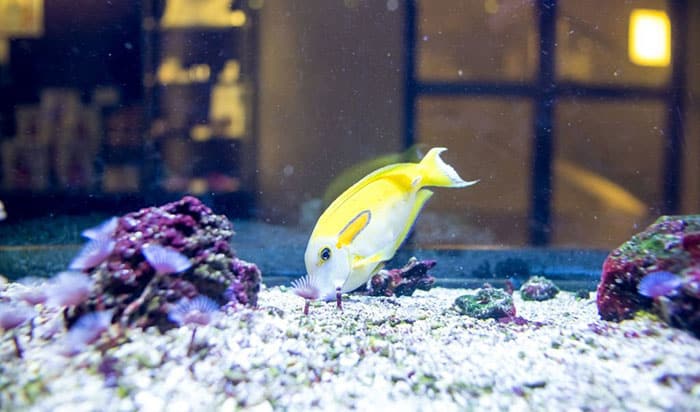Aquarium salt and Epsom salt are two common salts often used for different purposes in the aquarium hobby.
Aquarium salt (sodium chloride) is a general-purpose salt usable to make water more alkaline and help with fish health. Meanwhile, Epsom salt (magnesium sulfate) is a type of mineral salt used to improve the hardness of freshwater for some fish.
In this blog post, National Park Aquarium will take a closer look at the differences between aquarium salt and Epsom salt, discussing when it is appropriate to use each one.
What is Epsom salt?

Epsom salt is a mineral compound consisting of sulfate and magnesium. It’s often used in gardening and farming to help plants grow more vigorously.
Epsom salt is sometimes added to the water in the aquarium hobby to create a more natural environment for fish and other aquatic creatures.
Epsom salt is a naturally occurring mineral compound of magnesium sulfate. It has many uses, one of which is a stress-reliever for aquarium fish.
Aquarium fish are often stressed by the changes in their environment, such as when their tank is cleaned or new fish are added. The sulfates in Epsom salt can help to detoxify the water, making it healthier for your fish.
The magnesium in Epsom salt can also help to promote plant growth.
Aquarium salt vs Epsom salt: Which one should you use?
The commonly used pond salt (sodium chloride) and Epsom salt (magnesium sulfate) sometimes become necessary. They have very different functions and cannot replace each other, but both can be used safely. Below is a detailed comparison between aquarium salt vs epsom salt.
- Price: Aquarium salt is cheaper
- Composition: Aquarium salt is made up of sodium chloride, while Epsom salt is magnesium sulfate.
- Side effects: If aquarium salt is used in too high of a concentration, it can be harmful to fish. Epsom salt can also be harmful if used in too high a concentration.
- Effectiveness: Aquarium salt effectively raises the specific gravity and helps with the molting process in invertebrates. Epsom salt is effective as a laxative and to soothe sore muscles, but it is not as effective as a fertilizer for plants.
- Cure parasites: Aquarium salt
- Safe for use with aquarium plants: Epsom salt
- Adjust pH level and hardness level of tank water: Epsom salt
- Heals fish injuries: Aquarium salt
- Help treat dropsy: Epsom salt
- Help with the gill function: Aquarium salt
- Decrease the absorption of nitrates: Aquarium salt
Benefits Of Epsom Salt For Fish
Epsom salt is a type of salt that contains magnesium and sulfate, but no sodium. It is commonly used in aquariums to treat fish constipation caused by parasites, as well as dropsy and swim bladder issues. Epsom salt can also help to adjust the pH and hardness of the tank water.
When used in an aquarium, Epsom salt acts as a body relaxant for fish, promoting their health and well-being. The recommended dosage is ⅛ tablespoon of Epsom salt for every 5 gallons of water. However, it is important to use the correct concentration of Epsom salt, as too much can be harmful to fish.
How Much Epsom salt to Add to Water for Aquarium?
This greatly depends on the reason for its use, but generally, the guideline is about 1-3 teaspoons per 5 gallons of water. Always ensure to dissolve the Epsom salt thoroughly before adding it to the tank.
Can Too Much Aquarium Salt Kill Fish?
Yes, excessive aquarium salt can harm and potentially kill fish. It is important to follow the recommended dosages and always gradually introduce any changes to the water.
Conclusion
Epsom salt is a versatile product that can be used for many purposes, including as an aquarium salt. However, it is essential to remember that Epsom salt is not the same as regular aquarium salt and, therefore, cannot be used interchangeably.
Aquarium salt is specifically designed for use in freshwater aquariums, while Epsom salt can increase the hardness and adjust pH level, thus good for aquarium plants.
While both Aquarium salt vs Epsom salt have their benefits, it is essential to choose the right one for your needs to get the most out of it.




